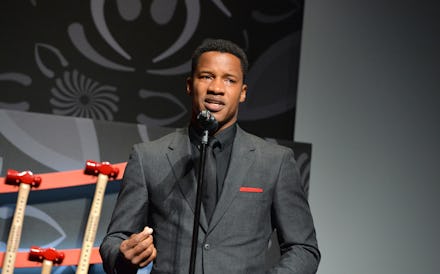No, 'Hollywood Reporter,' Nate Parker's rape trial is not a "sex scandal"

By all accounts, the Hollywood Reporter's analysis Thursday of how The Birth of a Nation's release and Oscar chances will be affected by new details about director and star Nate Parker's 1999 rape trial is a disaster.
At best, it's a misguided attempt to put the horrifying details of a case into an inappropriate context. At worst, the article, written by executive editor Stephen Galloway, consistently talks about rape allegations as a challenge for men to overcome, erasing the alleged victims in the process.
Nowhere is this more evident than in the Hollywood Reporter's original headline for the piece: "Nate Parker's path to forgiveness — how 'The Birth of a Nation' can survive a sex scandal." Shortly after publication, the site changed the wording to "a rape trial scandal."
The headline was still tweeted from the Hollywood Reporter's account, however, and garnered the ire of readers.
It's not just in the headline, either; in the piece itself, Galloway calls Fatty Arbuckle's trial for rape and manslaughter in 1921 a "major sex scandal." He then connects the trial to Parker's own, saying, "Now we may have another one."
The problem with calling the 1999 rape trial resurfacing a "sex scandal" — or a scandal at all, really — is that it removes its weight. Allegations of a serious crime are not titillating details to be dished over brunch. The woman who accused Parker of sexual assault died by suicide in 2012. Galloway is reducing a tragic event that ended in a life lost to a "scandal" for Parker to overcome.
Issues with the word "scandal" with regard to a Hollywood sex crime came up in 2014, when nude photos of several celebrities were released onto the internet. The highest profile victim of that event — crassly dubbed "the Fappening" — was Jennifer Lawrence. But in a Vanity Fair profile that November, Lawrence was emphatic about the release not being a scandal.
"It is not a scandal," she said in the article. "It is a sex crime. It is a sexual violation. It's disgusting."
If the flippant use of the word "scandal" was the piece's only problem, it would be an egregious, but likely to be forgotten, error. The rest of the analysis, however, is frankly offensive. To wit, Galloway uses stories of other accused rapists in Hollywood as potential avenues for Parker to not only weather the bad PR, but still win plaudits for his film. For example:
Before fleeing to France in 1978, Roman Polanski and his team assailed the behavior of the underage girl who accused him of statutory rape — despite the fact that the director had drugged her before having sex. Those smear tactics did not help his reputation, and Polanski — who had struck a deal, pleading guilty to unlawful sexual intercourse with a minor — was persona non grata in Hollywood for many years. That only changed when he won a best director Oscar for 2002's 'The Pianist.'
"Hollywood has had brushes with rape," Galloway writes, which is a remarkably blasé way of putting it. Another way of phrasing it might be that Hollywood has a deep-seated, far-reaching history of both permitting and covering up violent sexual crimes.
The piece ends with Galloway complimenting Parker on his "clever moves" to "never blame the victim" and giving "clear support to other women who have endured violence and sexual assault." This is the message Galloway and the Hollywood Reporter are sending: Rape allegations are just a scandal you can maneuver with some savvy PR strategy. Done well enough, said strategy can even keep your movie on track to win some Oscars.
Bottom line: A rape trial is not a sex scandal, and new details about said rape trial are not grounds for an awards season process story.